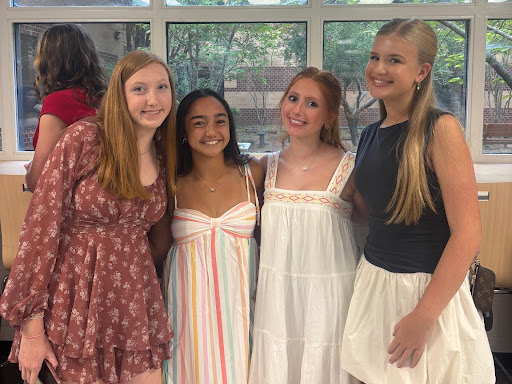With a new school year comes new inductees for high school honor societies. Many high schoolers join honor societies to build their college resumes, get involved with the school, and extend their interest in specific subjects.
Induction into these honor societies comes with status, and dues. Dues are fees that each member must pay at the beginning of the year to officially be a part of the society.
With hundreds of students joining honor societies every year, with thousands of dollars being spent for membership fees, it begs the question — where do dues for honor societies go?
Leesville offers an extensive collection of honor societies, including: National Honor Society, Rho Kappa (National Social Studies Honor Society), National English Honor Society, Math Honor Society, Science Honor Society, National Honor Society for Dance Arts, International Thespian Society, National Achievers Society, Spanish Honor Society, Latin Honor Society, New Alpha Theta and Tri-M Honor Society.
One of Leesville’s most popular honor societies, National English Honor Society (NEHS), requires members to pay dues every year they are in the society — $20 for new juniors, $20 for returning seniors, and $40 for new seniors.
According to the National English Honor Society, schools are responsible for a one time $150 Application fee and a $65 renewal fee. They require a single fee of $15 for new members, giving them access to student awards, grants, and scholarships.
Sophia Rodriguez, Leesville’s English Honor Society president and senior, said, “I know 50% for seniors goes towards our cords and 50% goes towards the actual English Honor Society.”
However, the English Honor Society charges a one time membership fee of $15, while new members are required to pay $20. Where does the extra money go?
Ashley Tabron, National English Honor Society Advisor, said via email, “The one-time fee goes straight to national headquarters. We are also charged a surcharge for using the required school website for handling money.”
The National English Honor Society must cover expenses for the entire year. They do not do any fundraising — dues are their only source of income.
Tabron said via email, “The total cost of cords and membership fees goes to the national organization, along with an annual membership fee to be considered an active chapter, and the rest goes to the chapter excluding the fees charged by the school website… we purchase books and supplies that the chapter uses for activities. Any additional funds are used for purchasing items from national headquarters and for use during service projects.”
One of the biggest expenses an honor society faces is cords. Cords, an honor to wear at graduation, must be purchased from the national organization. According to NEHS, money from returning members goes to their cord expense.
Tabron said, “With taxes, shipping, and handling, cords cost around $13 per student.”
Not every student that is qualified to join an honor society has the means to pay for their membership. Students that are in multiple honor societies are looking at hundreds of dollars of society dues.
Will Mabe, senior and member of four honor societies — Science National Honor society, Rho Kappa, New Alpha Theta, and National Honor Society — said, “I’m paying probably around $100-200 this year.”
The cost of joining one of these clubs can hinder applicants’ interests.
Mabe said, “It has been part of the process of what honor societies I want to apply to. If I’m not interested in the subject then I don’t want to pay money to do it.”
Rodriguez said, “I don’t really think we should have to pay, period, for any honor societies and stuff, but you kind of have to do what you have to do… I know there are some other societies that are like, ‘If you can’t pay, you can’t be a part of the club’, so I think some people underestimate their potential and think that they won’t be good enough to get in.”
This sense of “pay to play” creates an economic divide in our education system. Many students join honor societies to build their college resumes. Students are always told, if your resume is full, you will have a better chance at getting into a good college. Then, a good college brings about a good career and a bigger long term income. If financially comfortable students are given an advantage in high school, it will continue to fuel a great economic divide in our country.
Some honor societies provide financial aid to those students who cannot afford annual dues. Money should not be a barrier for membership into high school clubs.
According to Tabron, in extenuating circumstances, NEHS is able to waive student’s chapter funds. If a student is looking for financial aid, please reach out to the honor society’s teacher advisor.
The national organization excuses membership fees by providing each student access to scholarships, creative competitions, subject specific webinars, and service projects. They aim to enhance a student’s interest in one particular topic. Many of their resources are specific to the national chapter, making “buying” your way into the club acceptable.
Membership fees are used in a variety of ways — covering national chapter fees, cords, funding projects, and giving students subject specific resources. Even with all its benefits, honor society dues play a major role in the divide of our student body — those who have $100 to spare on clubs, and those who do not.

It makes my day better when people bring me Chipotle.

Leave a Reply